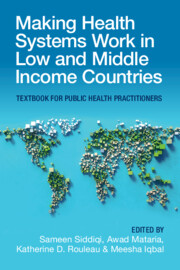 Making Health Systems Work in Low and Middle Income Countries
Making Health Systems Work in Low and Middle Income Countries Book contents
- Making Health Systems Work in Low and Middle Income Countries
- Reviews
- Making Health Systems Work in Low and Middle Income Countries
- Copyright page
- Dedication
- Contents
- About the Editors
- Contributors
- Preface
- Section 1 Analyzing Health Systems: Concepts, Components, Performance
- Section 2 Transforming Health Systems: Confronting Challenges, Seizing Opportunities
- Chapter 15 Universal Health Coverage and Beyond
- Chapter 16 Pro-Poor Expansion of Universal Health Coverage
- Chapter 17 Health Insurance for Advancing Universal Health Coverage
- Chapter 18 From Passive to Strategic Purchasing in Low and Middle Income Countries
- Chapter 19 Good Governance and Leadership for Better Health Systems
- Chapter 20 Developing a Balanced Health Workforce
- Chapter 21 Enhancing Equitable Access to Essential Medicines and Health Technologies
- Chapter 22 Health Information and Information Technology
- Chapter 23 Using Health Research for Evidence-Informed Decisions in Health Systems in L&MICs
- Chapter 24 Integrated People-Centered Health Care
- Chapter 25 Strengthening Hospital Governance and Management to Become High-Performing Organizations
- Chapter 26 Improving the Quality and Safety of Health Care in Low and Middle Income Countries
- Chapter 27 Harnessing the Contribution of the Private Health Care Sector toward Public Health Goals
- Chapter 28 Public–Private Partnership in Health Care Services
- Chapter 29 Embedding People’s Voice and Ensuring Participatory Governance
- Chapter 30 Achieving Health-Related Sustainable Development Goals
- Chapter 31 The Determinants of Health Systems
- Chapter 32 Integrating Essential Public Health Functions in Health Systems
- Chapter 33 Engaging in a Health Care Recovery Process
- Chapter 34 Health System Response to the COVID-19 Pandemic
- Chapter 35 Understanding the Global Health Architecture
- Chapter 36 Political Economy of Health Reforms in Low and Middle Income Countries
- Chapter 37 Better Health Systems for Better Outcomes
- Index
- References
Chapter 19 - Good Governance and Leadership for Better Health Systems
from Section 2 - Transforming Health Systems: Confronting Challenges, Seizing Opportunities
Published online by Cambridge University Press: 08 December 2022
- Making Health Systems Work in Low and Middle Income Countries
- Reviews
- Making Health Systems Work in Low and Middle Income Countries
- Copyright page
- Dedication
- Contents
- About the Editors
- Contributors
- Preface
- Section 1 Analyzing Health Systems: Concepts, Components, Performance
- Section 2 Transforming Health Systems: Confronting Challenges, Seizing Opportunities
- Chapter 15 Universal Health Coverage and Beyond
- Chapter 16 Pro-Poor Expansion of Universal Health Coverage
- Chapter 17 Health Insurance for Advancing Universal Health Coverage
- Chapter 18 From Passive to Strategic Purchasing in Low and Middle Income Countries
- Chapter 19 Good Governance and Leadership for Better Health Systems
- Chapter 20 Developing a Balanced Health Workforce
- Chapter 21 Enhancing Equitable Access to Essential Medicines and Health Technologies
- Chapter 22 Health Information and Information Technology
- Chapter 23 Using Health Research for Evidence-Informed Decisions in Health Systems in L&MICs
- Chapter 24 Integrated People-Centered Health Care
- Chapter 25 Strengthening Hospital Governance and Management to Become High-Performing Organizations
- Chapter 26 Improving the Quality and Safety of Health Care in Low and Middle Income Countries
- Chapter 27 Harnessing the Contribution of the Private Health Care Sector toward Public Health Goals
- Chapter 28 Public–Private Partnership in Health Care Services
- Chapter 29 Embedding People’s Voice and Ensuring Participatory Governance
- Chapter 30 Achieving Health-Related Sustainable Development Goals
- Chapter 31 The Determinants of Health Systems
- Chapter 32 Integrating Essential Public Health Functions in Health Systems
- Chapter 33 Engaging in a Health Care Recovery Process
- Chapter 34 Health System Response to the COVID-19 Pandemic
- Chapter 35 Understanding the Global Health Architecture
- Chapter 36 Political Economy of Health Reforms in Low and Middle Income Countries
- Chapter 37 Better Health Systems for Better Outcomes
- Index
- References
Summary
This Chapter provides health policymakers, managers, and care providers with an overview of strategies that enforce the key principles of good governance presented in Chapter 4. Strengthening participatory governance, building policy capacity, institutionalizing procedures to incorporate evidence in policymaking, and building regulatory capacity are critical for strengthening participation, transparency, and accountability and enforcing the rule of law. There is a variety of potential strategies that health system managers can adapt to improve governance of health systems at the policy, institutional, and healthcare professional levels, these include: (1) strengthening effectiveness of decentralization at the policy level; (2) linking accreditation to incentives, such as public funding or contractual agreements, at the institutional level; and (3) professionally led self-regulation at the health care professionals’ level. Control of corruption requires political reforms with a focus on open exchange of information, channels for participation of citizens in policymaking, and penalties for the misuse of power. It is important to note that the evidence on governance strategies in L&MICs remains elusive. Health leaders and managers need to cautiously assess and adapt strategies to their own contexts.
Keywords
- Type
- Chapter
- Information
- Making Health Systems Work in Low and Middle Income CountriesTextbook for Public Health Practitioners, pp. 294 - 305Publisher: Cambridge University PressPrint publication year: 2022


